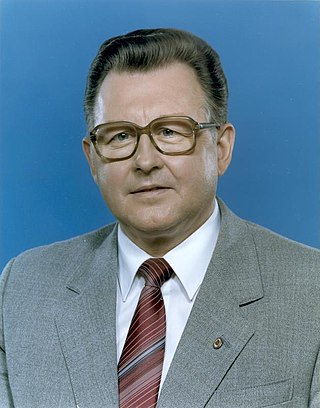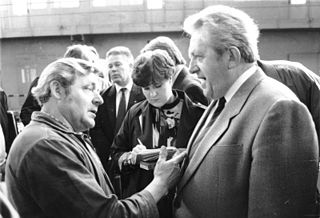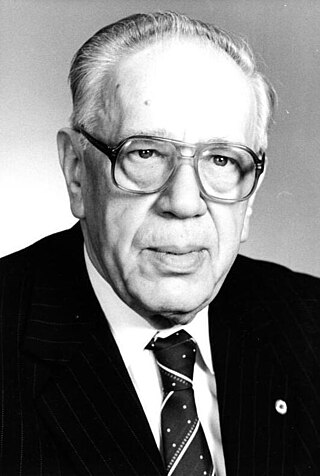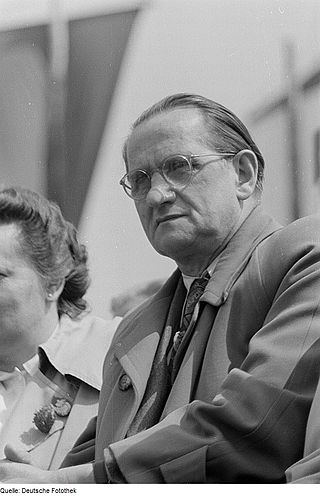Related Research Articles

Bernhard Quandt was a German politician and party functionary of the Socialist Unity Party (SED).

Werner Walde was a German politician and party functionary of the Socialist Unity Party (SED).

Werner Eberlein was a German politician and high-ranking party functionary of the Socialist Unity Party (SED).

Hans-Joachim "Achim"Böhme was a German politician and high-ranking party functionary of the Socialist Unity Party (SED).

Gerhard Grüneberg was a German politician and high-ranking party functionary of the Socialist Unity Party (SED).

Gerhard Müller was a German teacher, politician and party functionary of the Socialist Unity Party (SED).

Günter Sieber was a German politician, diplomat and party functionary of the Socialist Unity Party (SED).

Hans Albrecht was a German politician and high-ranking party functionary of the Socialist Unity Party (SED).

Georg Ewald was a German politician and high-ranking party functionary of the Socialist Unity Party (SED).

Herbert Ziegenhahn was a German politician and party functionary of the Socialist Unity Party (SED).

Ernst Timm was a German politician and party functionary of the Socialist Unity Party (SED).

Heinz Ziegner was a German politician and party functionary of the Socialist Unity Party (SED).
Alfred Rohde was a German politician and party functionary of the Socialist Unity Party (SED).
Werner Wittig was a German politician and party functionary of the Socialist Unity Party (SED).

Kurt HermannTiedke was a German politician and party functionary of the Socialist Unity Party (SED).

Alois Bräutigam was a German-Czech miner, policeman, politician and party functionary of the Socialist Unity Party (SED).

Max Ernst Opitz was a German politician and Holocaust survivor.

Heinz Kuhrig was a German politician of the Socialist Unity Party (SED).

Bruno Lietz was a German politician and party functionary of the Socialist Unity Party (SED).

Hans-Joachim "Jochen"Hoffmann was a German politician and party functionary of the Socialist Unity Party (SED).
References
- 1 2 3 4 5 6 7 8 9 10 "Semmelmann, Helmut". www.bundesstiftung-aufarbeitung.de. Wer war wer in der DDR? (in German). Federal Foundation for the Reappraisal of the SED Dictatorship. 2009. Retrieved 2024-06-08.
- 1 2 "Helmut Semmelmann". www.nd-archiv.de (in German). Neues Deutschland. 1989-11-11. Retrieved 2024-06-08.
- 1 2 Schlüter, Bernd, ed. (2007). "Abteilung Landwirtschaft im ZK der SED". www.argus.bstu.bundesarchiv.de (in German). Berlin: German Federal Archives . Retrieved 2024-06-08.
- ↑ Volkskammer der Deutschen Demokratischen Republik 1986-1990 (PDF) (in German). VEB Staatsverlag der Deutschen Demokratischen Republik. 1987. p. 39.
- ↑ "Übersicht über die gewählten Mitglieder des Sekretariats des ZK der SED (1949-1989)". www.bundesarchiv.de (in German). German Federal Archives. 2006. Retrieved 2024-06-10.
- ↑ Hertle, Hans-Hermann (1999). "9./10. November 1989: Handlungsunfähigkeit des SED-Zentralkomitees". www.chronik-der-mauer.de (in German). Berlin. Retrieved 2024-06-08.
- ↑ "Protokoll der 12. Tagung des SED-Zentralkomitees, 3. Dezember 1989 (Abschrift eines Tonmitschnitts)". www.chronik-der-mauer.de (in German). Retrieved 2024-04-28.